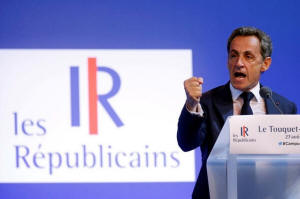|
France's Sarkozy says would change
constitution to ban burkinis
 Send a link to a friend
Send a link to a friend
 [August 29, 2016]
PARIS (Reuters) - Former French
president Nicholas Sarkozy said on Monday he would change the country's
constitution to ban full-body burkini swimsuits if he is re-elected to
his former role in a vote next April. [August 29, 2016]
PARIS (Reuters) - Former French
president Nicholas Sarkozy said on Monday he would change the country's
constitution to ban full-body burkini swimsuits if he is re-elected to
his former role in a vote next April.
Positioning himself as a defender of French values and tough on
immigration, the conservative said last week that he would impose a
nationwide ban on the swimwear that has divided the Socialist-led
government and dominated French political debate through much of August.
France's highest administrative court suspended on Friday a ban on
burkinis that had spread to a dozen French coastal cities on the grounds
they violated fundamental liberties.
The burkini bans have exposed secular France's difficulties grappling
with religious tolerance after Islamist militant attacks in a Normandy
church and the Riviera city of Nice in July. Images of armed police
apparently enforcing the ban on a woman on a beach in Nice have added to
the controversy.

The bans had been justified on public order grounds, and Socialist Prime
Minister Manuel Valls appeared to defend the town officials who imposed
them.
After the court set the bans aside, however, Interior Minister Bernard
Cazeneuve said a law against the garments would be ruled
unconstitutional.
Asked about that risk, Sarkozy said: "Well, then we change the
constitution. We've changed it thirty odd times, it's not a problem."
Sarkozy is struggling to catch up in the polls with rival Alain Juppe, a
mild-mannered, more centrist former prime minister before their
Republicains party's primary elections in late November.
[to top of second column] |

Nicolas Sarkozy, former head of the Les Republicains political party
and former French president, attends the party's weekend summer
university youth meeting in Le Touquet, France August 27, 2016.
REUTERS/Pascal Rossignol

Cazeneuve, who was meeting with French Muslim leaders on Monday to
ease religious tensions, said he would name veteran politician
Jean-Pierre Chevenement to head an independent body charged with
handling relations between the state and the religion's
representatives.
(Reporting by Leigh Thomas and Myriam Rivet; Editing by Andrew
Callus and Toby Chopra)
[© 2016 Thomson Reuters. All rights
reserved.]
Copyright 2016 Reuters. All rights reserved. This material may not be published,
broadcast, rewritten or redistributed.

 |